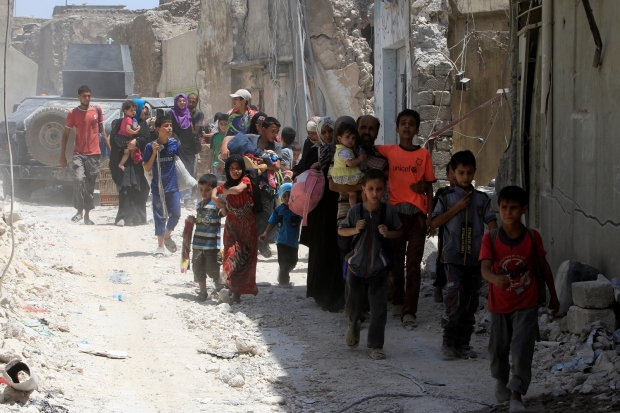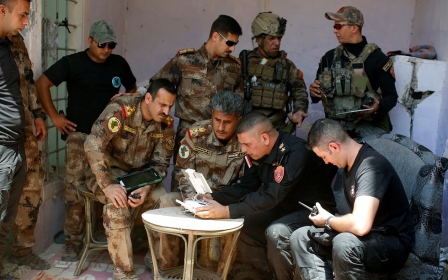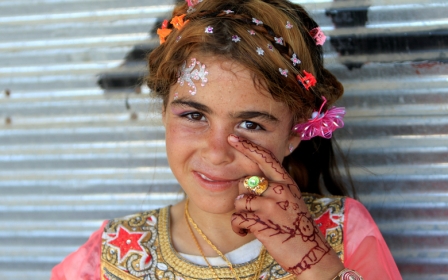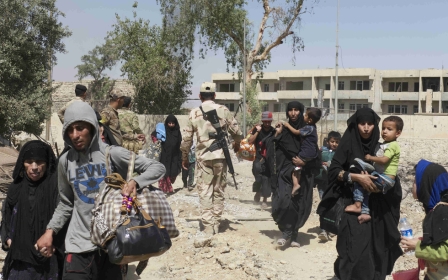Battle for Mosul: Desperate civilians flee last Islamic State pocket
By Stephen Kalin
Shop-owner Adnan dragged himself from the rubble two days in a row after the houses he was sheltering in were bombed, one after the other, in the US-led campaign to uproot the last Islamic State (IS) group militants from Mosul.
"Daesh (IS) forced us out of our home, so we moved to a relative's house nearby. Yesterday the house was bombed," he said after the army evacuated him on Monday. "We moved to my cousin's house and this morning it was also bombed."
Adnan, who has shrapnel lodged in his skull from an earlier mortar attack, said he survived, with others, by hiding in the houses' underground cellars.
Thousands of people in the last patch of Mosul still controlled by the militants have been huddling for weeks in similar conditions, with little food and no electricity. They fear being bombed if they remain in place and being shot by snipers if they try to flee.
Trauma
Iraqi forces have pushed IS into a shrinking rectangle no more than 300 by 500 metres beside the Tigris river, but slowed their advance on Tuesday out of caution for an estimated 10,000 civilians trapped there alongside the militants.
Residents have been caught in the crossfire - and often intentionally targeted by IS - since the offensive began more than eight months ago. Thousands have been killed and about 900,000 - around half of Mosul's pre-war population - have been displaced.
Those in the historic Old City, the offensive's final target, have been besieged and under fire for longer than those in any other part of Mosul, and the toll is apparent.
At a mustering point less than a kilometre from the frontline, residents rattled off the latest prices of basic goods which they said had become prohibitively expensive in the past three months: a kilogram of lentils $51, rice for $21.5 and flour for $19.
Mohammed Taher, a young man from the Makawi area of the Old City, said Russian-speaking IS militants spread out across the neighbourhood had impeded civilian movement.
"It was a prison," he said. "Five days ago they locked the door on us. They said, 'Don't come out, die inside'. But the army came and freed us."
A European medic at a field hospital said he has seen more severe trauma cases among civilians fleeing the fighting in the past week than he had in 20 years of service back home.
Screening
From the mustering point, camouflaged army lorries carry the evacuees across the Tigris river to a security screening centre in the shadow of the Nineveh Oberoi Hotel, a former five-star hotel, which IS once used to house foreign fighters and suicide bombers.
More than 4,000 people have passed through that screening centre since mid-May, said Lieutenant Colonel Khalid al-Jabouri, who runs the site. In that time, security forces have detained around 400 suspected IS members, he said.
"They are wanted, so they cross with the civilians like they are one of them," he told Reuters. "In order to relieve our country from these pigs, we have to check every person who comes and goes."
Jabouri pointed out two middle-aged men who intelligence officers had pulled aside from among several dozen others for suspected links to IS. One wore a traditional white robe and black headdress, the other had a shaved head and a bandage on one leg.
"That person is a Daesh member," he said, pointing at the second man. "He crossed without papers, but he is Daesh. He crossed wounded or pretending to be wounded."
The number of IS militants fighting in Mosul, by far the biggest city the group has ever controlled, has dwindled from thousands at the start of the US-backed offensive to a couple of hundred now, according to the Iraqi military.
The security forces rely on a list of names and witness testimonies to identify suspected IS members. Even as the military offensive draws to a close, though, it is clear that some militants have managed to slip through the cracks.
Suspected militants are arrested on a daily basis in Mosul neighbourhoods proclaimed "liberated" from IS months ago, and several suicide attacks have already been carried out in those areas.
New MEE newsletter: Jerusalem Dispatch
Sign up to get the latest insights and analysis on Israel-Palestine, alongside Turkey Unpacked and other MEE newsletters
Middle East Eye delivers independent and unrivalled coverage and analysis of the Middle East, North Africa and beyond. To learn more about republishing this content and the associated fees, please fill out this form. More about MEE can be found here.





